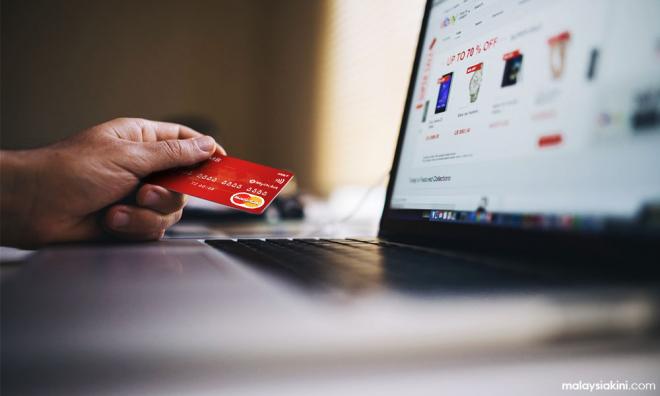
Published by Malaysiakini & Focus Malaysia, image from Malaysiakini.
The Covid-19 pandemic has accelerated the transition to cashless payments in most Southeast Asian countries to facilitate contactless transactions and further curb the spread of the virus.
Nevertheless, it is also crucial for us to be cautious because the method also has some drawbacks without us knowing it.
Indeed, cashless payment has become the most preferred payment method for both consumers and sellers in this pandemic era.
However, the blind use of cashless payments can have numerous adverse effects on people’s well-being, especially poor consumer behaviour, which is defined as a process through which an identifiable consumer group actually makes buying decisions.
Based on Accenture’s study titled “Covid-19: How consumer behaviour will change,” it is clear the crisis drives permanent changes in consumer behaviour. Consumer preferences have also been centred on the most basic needs, sending demand soaring for hygiene, cleaning and staple products, while non-essential categories are slumping.
Although it is definitely a positive thing to note that Covid-19 has triggered the high use of the cashless payment, individuals should be conscientious about its dire consequences, especially on how they spend and how much they spend on products.
Besides, the apparent factor of poor spending behaviour is that it can lead to panic buying, where individuals appear to overspend without even worrying about their financial condition.
The Covid-19 pandemic also seemed to provide individuals with a high degree of fear and anxiety, which later shifted their habits to panic buying that could adversely affect their income during the crisis.
This form of behaviour would have a positive effect on the economy as a whole, as it revs up private consumption spending essential to uplift the economy. At the same time, however, it may also have a direct impact on the customers. So, this would highly require people to spend moderately, depending on their actual ability to pay.
At first, some developed countries such as Denmark have entirely encouraged cashless society, but they have subsequently slowed down their initiatives for fear that it will mean that some people are unable to manage their money efficiently and cost-effectively.
As revealed recently on a study on “Economy SEA 2020” by Google, Temasek and Bain & Company which is about the significant impact of digital payments during the Covid-19 period on Southeast Asian countries, consumer cash transactions declined to 37 percent from 48 percent pre-Covid-19.
Not just that, contactless and digital payments have also gained traction because of the effect of Covid-19 stimulus fund transfers on people, such as Covid-19 relief measures in Singapore.
Malaysia is also no exception in this as previous stimulus packages such as Prihatin and Penjana have successfully generated an enormous effect on cashless transactions, not to mention the latest Permai stimulus package that will inevitably add to the effect.
Following the recent reimplementation of movement control order (MCO), Darshiniy Selvaratnam, senior market analyst for IDC Financial Insight, stated that this year’s MCO was the game-changer, as many transactions that would typically have taken place in person and be conducted in cash terms moved online.
However, one thing has to be considered: the widespread use of cashless payments via credit cards or mobile apps could substantially increase unhealthy food consumption, based on the new research published in the Journal of the Association for Consumer Research.
In particular, it demonstrates that when the participants considered making cashless payments, the absence of the negative arousal reduced their attention to the health risks, increasing their purchase likelihood and willingness to pay.
It is relatable because the Covid-19, which comes with numerous measures to curb the virus’ spread, particularly lockdown, has undoubtedly increased the possibility of an unhealthy lifestyle.
It can generally be deduced that people will tend to spend their money on unhealthy food due to pandemic fatigue, resulting from feeling unmotivated and overwhelmed by the endless amounts of standard operating procedures and countless recommended behaviours to protect themselves and others from the virus.
Health experts also agreed that there would also be negative emotions like worry, sadness and frustration, abnormal routine, lack of focus, disturbance in eating or sleeping patterns as indicators of pandemic fatigue.
This would also illustrate that pandemic fatigue will have many unhealthy effects on individuals, forcing them to spend more on unnecessary things to alleviate the pandemic’s harmful effects.
Therefore, this is likely to be the major role of policymakers to overcome the problem by educating consumers adequately about the unintended negative impacts of cashless payments. Public awareness is genuinely essential to cushion the people’s financial blow caused by the pandemic’s detrimental effects.
It has to be emphasised this is not a suggestion to go against cashless payment as it is still a preferred payment method in this era. It is only a matter of public awareness that people should acquire to avoid the risk of over-spending and unnecessary spending due to the pandemic.
After all, during the country’s rapid transition into a cashless society, people should be mindful because their financial status is still the top priority, which will determine whether they’ll have financial anxiety to contend with.
Although cashless payment is a convenient method, remember that we could cross a line at some point where convenience can cause us more harm than good.
Farhan Kamarulzaman is a Research Assistant at Emir Research, an independent think tank focused on strategic policy recommendations based on rigorous research.

